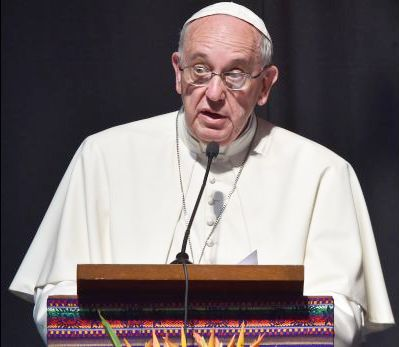Pope's supporters in Argentina saying that he has enemies right, left and centre
Target Jorge Bergoglio
The attacks from right and left against García Cuerva's promotion and Tucho Fernández's homily were aimed at the Pope. Pichetto, the great provocateur.
Any excuse puts Jorge Bergoglio in the crosshairs of those who consider him an "enemy" and who, according to his entourage, represent the extremism of the right and left, and also economic liberalism, who since his arrival at the Vatican have criticised him both for his social preaching and for his decision to reform the ecclesiastical structures. This time the questioning came from the political and clerical side, and was aimed at the appointment of Cardinal Mario Poli's successor in the archdiocese of Buenos Aires and at the doctrinal essence of a homily for the 40th anniversary of democracy and the concept of poverty.
One of these attacks against the Pontiff came from the appointment of Jorge García Cuerva in the primatiak jurisdiction of Buenos Aires, who from the first minute was "pushed" - acknowledged the then Diocesan from Santa Cruz - to the Peronist side of the rift because of his friendship with Sergio Massa and Malena Galmarini and a homily in 2016, when he was still a priest, vindicating that party identity in a Mass for the anniversary of the death of Juan Domingo Perón. "Links with Kirchnerism? Politically, I assure you that my position is different," she said in statements to LU12 Río Gallegos, distancing herself from the ruling party's leadership, including her neighbour, Governor Alicia Kirchner.
García Cuerva also made his party independence visible by exhibiting photos with opposition figures such as former governor María Eugenia Vidal or former Social Development minister Carolina Stanley; and underlining the warnings he recently made about the impact of inflation on vulnerable sectors; an economic variable that Alberto Fernández's administration is unable to control and which he defined - as Letra P reported before his appointment - as the "tax on the poor". In this context, it was also reported that the mayor of Buenos Aires, Horacio Rodríguez Larreta, called him to congratulate him on his promotion to the archbishopric.
Another event that was read as a shot across the bow against Bergoglio was the attack on what is considered the purest Papal theological interpreter: Archbishop Tucho Fernández. It followed his preaching during a religious celebration for the 40th anniversary of democracy in the cathedral of La Plata, which was attended by the governor Axel Kicillof, the vice-governor Verónica Magario and the local mayor Julio Garro, among other authorities. There, the prelate spoke about the efforts of those who work in the streets collecting cardboard and the criticism they receive from people who "live off rents", "politics" or "inheritances".
Operations left and right
Tucho Fernández's sermon on meritocracy and social rights provoked a reaction from left-wing leaders, who used their party publications to denounce: "The Church talks about the poor and celebrates with those who generate the most poverty", accompanied by an image of the church leader together with provincial and municipal leaders.
At the other extreme of political ideology, the presidential candidate Miguel Ángel Pichetto (Juntos por el Cambio) accused the archbishop of "vindicating the world of cartoneros and the homeland of (Juan) Grabois", another pre-candidate for the Casa Rosada. The prelate came out to refute the comment, replying on Twitter with the video of his complete homily and a suggestion: "Listening to the whole context, one can better understand the ultimate meaning of what he said".
It was not that phrase of the leader of the self-styled Republican Peronism that was interpreted as an attack on the pope, but another. The two most important men in the Church, the bishops of La Plata and Buenos Aires, clearly identify with the old ideas of the "pobrismo" and that Argentine society must put aside in order to move forward in a process linked to production and work", said Pichetto, one of the most critical leaders of the Pontiff, in relation to two prelates of Bergoglio's greatest confidence.
Tucho Fernández was also the one who put in context these proposals from the extremes of political ideology: "What is striking is how today the extreme left, the extreme right and economic liberalism are united with the same enemies with a common enemy, which is Francis", he pointed out in an interview with the Spanish religious portal RD, in which he also denounced having been the victim of "operations that come from these very different sectors but curiously with the same methodologies"; and he even said that he had been the victim of "operations that come from these very different sectors but curiously with the same methodologies"; and he even said that he had been the victim of "operations that come from these very different sectors but curiously with the same methodologies".
Cathcon: The Church deserves better than warmed-up Peronism.










.jpeg)

Comments